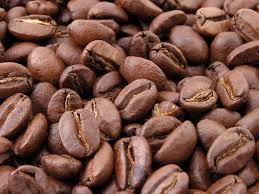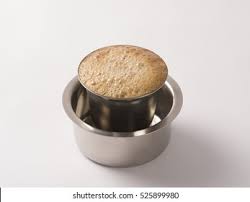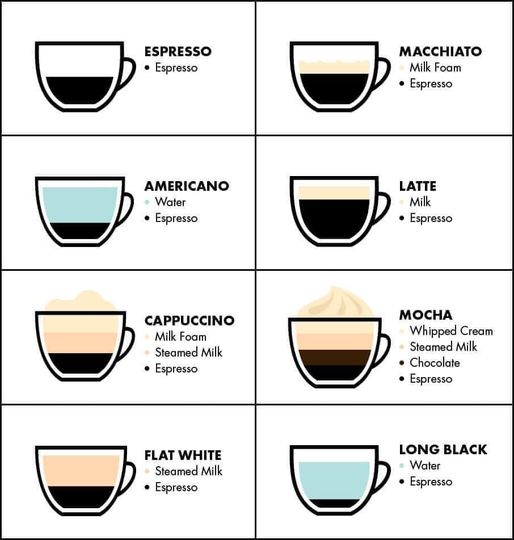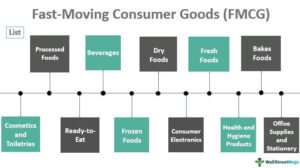Did you know drinking coffee everyday is awesomely good effect to you?
Coffee is a brewed drink prepared from roasted coffee beans, the seeds of berries from certain Coffea species. From the coffee fruit, the seeds are separated to produce a stable, raw product: unroasted green coffee. Wikipedia
Coffee is darkly colored, bitter, slightly acidic and has a stimulating effect in humans, primarily due to its caffeine content.[3] It is one of the most popular drinks in the world,[4] and can be prepared and presented in a variety of ways (e.g., espresso, French press, caffè latte, or already-brewed canned coffee). It is usually served hot, although chilled or iced coffee is common. Sugar, sugar substitutes, milk or cream are often used to lessen the bitter taste. It may be served with coffee cake or another sweet dessert like doughnuts. A commercial establishment that sells prepared coffee beverages is known as a coffee shop (not to be confused with Dutch coffeeshops selling cannabis).

The word coffee entered the English language in 1582 via the Dutch koffie, borrowed from the Ottoman Turkish kahve (قهوه), borrowed in turn from the Arabic qahwah (قَهْوَة).[11] The Arabic word qahwah was traditionally held to refer to a type of wine whose etymology is given by Arab lexicographers as deriving from the verb قَهِيَ qahiya, ‘to lack hunger’, in reference to the drink’s reputation as an appetite suppressant.
The term coffee pot dates from 1705.[12] The expression coffee break was first attested in 1952.[12]
The earliest credible evidence of coffee-drinking or knowledge of the coffee tree appears in the middle of the 15th century in the accounts of Ahmed al-Ghaffar in Yemen.[2] It was here in Arabia that coffee seeds were first roasted and brewed, in a similar way to how it is prepared now. Coffee was used by Sufi circles to stay awake for their religious rituals.
By the 16th century, coffee had reached the rest of the Middle East, Persia, Turkey, and northern Africa. The first coffee seeds were smuggled out of the Middle East by Sufi Baba Budan from Yemen to the Indian subcontinent during the time. Before then, all exported coffee was boiled or otherwise sterilised. Portraits of Baba Budan depict him as having smuggled seven coffee seeds by strapping them to his chest. The first plants grown from these smuggled seeds were planted in Mysore.

The Dutch East India Company was the first to import coffee on a large scale.[22] The Dutch later grew the crop in Java and Ceylon.[23] The first exports of Indonesian coffee from Java to the Netherlands occurred in 1711.[24]
Through the efforts of the British East India Company, coffee became popular in England as well. John Evelyn recorded tasting the drink at Oxford in England in a diary entry of May 1637 to where it had been brought by a student of Balliol College from Crete named Nathaniel Conopios of Crete.[25][26] Oxford’s Queen’s Lane Coffee House, established in 1654, is still in existence today. Coffee was introduced in France in 1657, and in Austria and Poland after the 1683 Battle of Vienna.

Is coffee good for you? Health benefits, disadvantages, and more
- Research suggests drinking coffee in moderation reduces the risk of chronic liver disease by a fifth.
- Coffee drinkers were found to be less likely to develop fatty liver disease, liver cancer or die from chronic liver disease.
- Three to four cups daily can help protect against a number of health conditions.

Your morning caffeine boost isn’t just helping kick-start your day – it might have health benefits as well. Drinking a few cups of coffee daily reduces the risk of chronic liver disease by over a fifth, according to a new study published in the online journal BMC Public Health.
Different Methods of drinking coffee



What are the benefits of drinking Coffee?
Europe consumes more coffee than any other region, exceeding 3 million tonnes in 2019. That works out around 4.1 kilogrammes of beans per inhabitant. Germany is the biggest importer overall.
But despite its universal appeal, the humble coffee bean has at different times been labelled both a health hazard and a health boon. And while a morning mug of coffee can make you more alert and better able to concentrate, too much caffeine can lead to restlessness, feelings of anxiety and an increased heart rate.
Does Coffee have Nutritional value?

Coffee drinking and liver disease
To investigate the impact of coffee on our health, scientists at the University of Southampton in the UK, analysed the UK Biobank‘s health data, which has been collected from almost half a million people over more than a decade.
Results suggest drinking coffee in any form – ground, instant, caffeinated or not – reduces the risk of developing chronic or fatty liver disease by 19%, liver cancer by 21% and cuts deaths from chronic liver disease by almost half. Liver diseases like these kill around two million people each year.
Positive health benefits were linked to people regularly drinking a moderate amount: three to four cups each day was found to be the optimum consumption level, with ground coffee slightly more beneficial than the instant variety.
“Coffee is widely accessible, and the benefits we see from our study may mean it could offer a potential preventative treatment for chronic liver disease. This would be especially valuable in countries with lower income and worse access to healthcare and where the burden of chronic liver disease is highest,” the study’s lead author, Dr. Oliver Kennedy, told Medical News Today.

Drinking Caffiene and Health effects.
A 2017 review of clinical trials found that drinking coffee is generally safe within usual levels of intake and is more likely to improve health outcomes than to cause harm at doses of 3 or 4 cups of coffee daily. Exceptions include possible increased risk in women having bone fractures, and a possible increased risk in pregnant women of fetal loss or decreased birth weight.[5] Results were complicated by poor study quality, and differences in age, gender, health status, and serving size.[5]
Coffee’s health benefits
But health benefits associated with coffee consumption don’t stop there. Moderate but regular coffee intake could reduce the risk of other diseases, too. Here’s how:

Digestion
A 1999 review found that coffee does not cause indigestion, but may promote gastrointestinal reflux.[147] Two reviews of clinical studies on people recovering from abdominal, colorectal, and gynecological surgery found that coffee consumption was safe and effective for enhancing postoperative gastrointestinal function.[148][149]
Mortality
In 2012, the National Institutes of Health–AARP Diet and Health Study found that higher coffee consumption was associated with lower risk of death, and that those who drank any coffee lived longer than those who did not. However the authors noted, “whether this was a causal or associational finding cannot be determined from our data.”[150] A 2014 meta-analysis found that coffee consumption (4 cups/day) was inversely associated with all-cause mortality (a 16% lower risk), as well as cardiovascular disease mortality specifically (a 21% lower risk from drinking 3 cups/day), but not with cancer mortality[151] with exception being oral cancer mortality.[152]

Additional meta-analyses corroborated these findings, showing that higher coffee consumption (2–4 cups per day) was associated with a reduced risk of death by all disease causes.[153][154] An association of coffee drinking with reduced risk for death from various sources was confirmed by a widely cited prospective cohort study of ten European countries in 2017.[155]
Cardiovascular disease
Moderate coffee consumption is not a risk factor for coronary heart disease.[156] A 2012 meta-analysis concluded that people who drank moderate amounts of coffee had a lower rate of heart failure, with the biggest effect found for those who drank more than four cups a day.[157] A 2014 meta-analysis concluded that cardiovascular disease, such as coronary artery disease and stroke, is less likely with three to five cups of non-decaffeinated coffee per day, but more likely with over five cups per day.[158] A 2016 meta-analysis showed that coffee consumption was associated with a reduced risk of death in patients who have had a myocardial infarction.[159]
The effect of no or moderate daily consumption of coffee on risk for developing hypertension has been assessed in several reviews during the 21st century. A 2019 review found that one to two cups consumed per day had no effect on hypertension risk, whereas drinking three or more cups per day reduced the risk,[160] a finding in agreement with a 2017 analysis which showed a 9% lower risk of hypertension with long-term consumption of up to seven cups of coffee per day.[161] Another review in 2018 found that the risk of hypertension was reduced by 2% with each one cup per day increment of coffee consumption up to 8 cups per day, compared with people who did not consume any coffee.[162] By contrast, a 2011 review had found that drinking one to three cups of coffee per day may pose a slightly increased risk of developing hypertension.[163]
Heart disease – A recent study of the role of diet and behaviour in heart failure found that increased coffee consumption was associated with reduced long-term risk. Researchers used AI to analyse existing datasets and found that one or more cups of coffee a day may reduce the occurrence of heart failure by nearly a third.

Mental health
The UK NHS advises that avoiding coffee may reduce anxiety.[164] Caffeine, the major active ingredient in coffee, is associated with anxiety.[165][166] At high doses, typically greater than 300 mg, caffeine can both cause and worsen anxiety.[167] For some people, discontinuing caffeine use can significantly reduce anxiety.[168] Caffeine-induced anxiety disorder is a subclass of substance- or medication-induced anxiety disorder.[169] Populations that may be most impacted by caffeine consumption are adolescents and those already suffering anxiety disorders.[170] Preliminary research indicated the possibility of a beneficial relationship between coffee intake and reduced depression.[5][171][172] Long-term preliminary research, including assessment of symptoms for dementia and cognitive impairment, was inconclusive for coffee having an effect in the elderly, mainly due to the poor quality of the studies.[5][173]
Neurological health – Several studies have linked caffeine consumption to a reduced risk of developing Parkinson’s disease. Researchers are still not entirely clear what role coffee plays, with most attributing the protective effect to caffeine. Other recent research has suggested that some of the fatty acids contained in the drink may also influence the disease.
Depression – Drinking at least two cups of coffee daily has been linked to a reduced risk of depression, according to a meta-analysis commissioned by the US National Coffee Association. Separate research suggests that coffee constituents like caffeine, chlorogenic acid, ferulic acid and caffeic acid could all influence the pathology of depression.
Parkinson’s disease
Meta-analyses have consistently found that long-term coffee consumption is associated with a lower risk of Parkinson’s disease.[5]
Type II diabetes
In a systematic review and meta-analysis of 28 prospective observational studies, representing over one million participants, every additional cup of caffeinated and decaffeinated coffee consumed in a day was associated, respectively, with a 9% and 6% lower risk of type 2 diabetes.[174]
Cancer
Research on the effects of coffee consumption on cancer risk generally has indicated no effect[175][176] or a slightly lower risk of cancer, particularly in the liver.[177][178]Coffee may influence the development of cancer cells in the body in several ways. By stimulating bile acids, for example, which speed up digestion through the colon, colon tissue could be exposed to fewer carcinogens. The American Institute for Cancer Research says that there is ‘probable evidence’ that drinking coffee reduces the risk of endometrial and liver cancers, and it could also have an impact on cancers of the skin, mouth and throat, although the evidence here is less conclusive.
This is in contrast to suggestions dating back to the 1990s linking coffee consumption with developing cancer, which have since been revoked.
Liver disease
Increasing evidence has shown that coffee consumption is protective against the progression of liver disease to cirrhosis. This is associated with antioxidant and anti-fibrotic effects of coffee.[179]

So, armed with this knowledge, your next cup of coffee should be even more enjoyable.
Coffee and its Importance in social life.
Caffeine is an important feature of coffee, but coffee contains many compounds, and there are different ways of drinking it. This makes it difficult to determine exactly how coffee affects a person and which components have benefits and risks.
A person who wishes to derive health benefits from coffee consumption should avoid exceeding the daily recommended intake and try to monitor the ingredients they add — such as sugar, cream, and flavorings — as these may not be healthy.
Pregnant people and those at risk of bone fractures may wish to avoid coffee.
Risks
Drinking a lot of coffee can also have some adverse effectsTrusted Source. These may include the following.
Bone fractures
Some studies have suggested that women who drink a lot of coffee may have a higher risk of bone fractures.
Men with a higher coffee intake, on the other hand, appear to have a slightly lower risk.
Complications during pregnancy
Coffee consumption may also not be safe during pregnancy. In fact, there is some evidence to suggest a link between high coffee consumption and pregnancy loss, low birth weight, and preterm birth.
Endometriosis
There may be a higher risk of endometriosis among women who drink coffee, but there is not enough evidence to confirm such a link.
Gastroesophageal reflux disease
People who drink a lot of coffee may have a slightly higher risk of this condition.
Anxiety
Consuming high amounts of caffeine may increase the riskTrusted Source of anxiety, especially among people with panic disorder or social anxiety disorder. Less commonly, caffeine may trigger mania and psychosis in those who are susceptible.
Mental health conditions
One study from 2016Trusted Source concluded that a high intake of caffeine during adolescence could lead to permanent changes in the brain.
The scientists behind the study expressed concern that this could increase the risk of anxiety-related conditions in adulthood.
Exposure to toxic ingredients
In 2015, a group of researchers found relatively high levels of mycotoxins in commercial coffee. Mycotoxins are toxic substances that can contaminate coffee as a natural product.
Some people worry that acrylamide, which is another chemical present in coffee, may be dangerous. Find out more here.
Side effects
Although consuming caffeine may offer some benefits, there can be negative side effects if a person drinks too much of it. These side effects may include:
- adverse interactions with particular, medications such as certain psychiatric drugs, thyroid medications, heartburn drugs, and antibiotics
- possible spinal bone loss in women who drink more than 300 milligrams (mg) per day and who do not consume enough calcium
- gastrointestinal problems
- an increase in blood pressure
- an increase in the risk of myocardial ischemia, which is a type of heart disease, if a person consumes coffee during exercise
- fertility difficultiesTrusted Source
- negative effects on a growing fetus, such as low birth weight, if a person consumes a large amount of coffee during pregnancy
- irritability and insomnia in nursing infants, if a person consumes coffee during lactation
- dehydration, but this is not conclusive and may be limitedTrusted Source to excessive caffeine consumption
- worsened symptoms of certain mental health conditions, such as schizophrenia or bipolar disorder
- an increased risk of suicide
- coffee-specific disordersTrusted Source, which include:
- caffeine intoxication (or overdose)
- caffeine-induced anxiety disorder
- caffeine-induced sleep disorder (or insomnia)
- caffeine-related disorder not otherwise specified
Coffee vs. tea
Both coffee and tea contain caffeine, so they may have some of the same benefits, risks, and side effects.
However, although the amount of caffeine in each beverage can depend on the type of coffee or tea, generally, one 8-oz cup of coffee contains about 95 mg of caffeine. Similar-sized cups of black and green tea contain only 48 mg and 29 mg of caffeine, respectively.
There may be some differences in the way that drinking tea and coffee may impact different people, depending on which beverage they prefer and how much of it they consume.
According to a 2018 study that compared the positive effects of coffee and tea consumption, the differences in benefits are as follows:
| Type | Benefit |
|---|---|
| Coffee | Coffee may decrease the risk of mortality from heart disease and cancer, specifically in women. Coffee may also decrease the risk of respiratory mortality, specifically in men. Women who drink only coffee or up to 40%Trusted Source tea may have the lowest overall mortality from various conditions, but those who drink higher percentages of tea may have a higher mortality risk. |
| Tea | Tea may decrease the risk of mortality from heart disease and cancer, specifically in men. Also, men who drink 30–50% tea may have the lowest mortality risk compared with those who only drink coffee. |
The overall conclusion of the study is that coffee and tea both have their own benefits depending on the quantity consumed, and these benefits may vary among men and women. The difference in impact based on sex may be related to how coffee affects sex hormones.
Top most festival Products FMCG consumers search today
World Wide Festive Trends Decoded What Indian festive consumers seek...
Read MoreHow right selection of FMCG Salesmen improves brand market share
How can FMCG Companies improve salesman’s technique in order to...
Read MoreHow most searched Fmcg sales and marketing words help newbie salesman
Why undestand FMCG sales management? Sales management is the process...
Read MoreHow Successful FMCG Salesman Starts his Day, a guide
How does one become a good sales executive in the...
Read More







Pingback: How Tea drinking became popular in India in different flavors and colors.